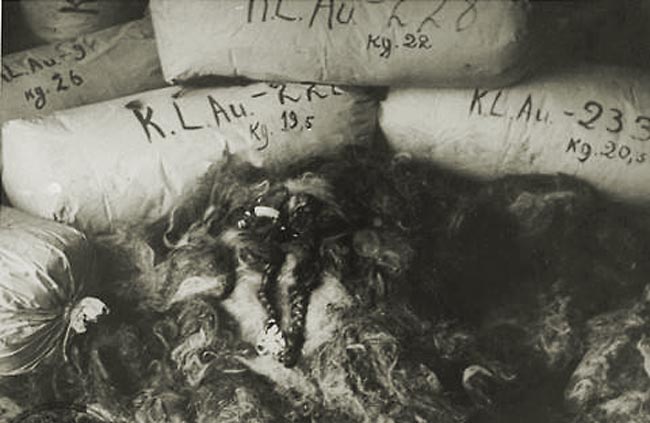The dead want the mice to have their hair, the birds in the birchwood to nest with the clippings. There is enough, there’s a mountain of their musty curls.
They didn’t want a museum made of their misery. Let it vanish, they say, as they drift across the boundaries, as they settle in the muddy water.
The dead did not want it, who cannot forget. It was not the remains but the living dying they wanted to live on, like super-vigorous rust, and mould, and mildew, and moths, to sweep the place bare.
Let us become birch trees and moss, plead the dead, let us become birds and mice. Their sleeves are caught in the instruments, rusting and decaying.
Caught on projections in silence, in black and white, they take the same few captive steps, caught, who cannot forget, by the living who cannot remember.
Einstein said, Let there be light, and he skied down Europe and jumped the Atlantic with this thought in mind. And there was darkness even over the great mountains. But the sun went on turning in and out from the centre in a permanent explosion. Our little deaths can’t distract an Achilles when he rages in sight of his dying in the burnished shield. No-one approaches.
Such as the sun had the word long before Albert made away with his one stone. Such as you’ve got you can’t keep. Such as you give blesses you. The sun admires itself in countless long-sought pairs of jewels.
It gives its presence to the cold and deadly places, where ferocious air and the bitter, unbowed rock tear at each other.
We look up and see it’s possible to stand on the earth and be like the sun. The mountains pour down their strength in a white light and water, and they cast carved stones for us to cross.
The shadow breathes on them, even the peaks hear rumours of war. Like a cloud, the intellect of man passes over them with radio-isotopes and halogenated hydrocarbons. Our stake in the ice-caps. A passing cloud.
Albert watches the steam rise and feels the slush under his feet. It’s the earth moves away or something. It’s not the sun’s fault it stops working. He’s nobody’s fool but his shares in the company don’t seem to pay the electricity. Let the young ski. He’d be happy to sit in the sun.
There were no signs on the streets and the signs were everywhere. Every face had somebody missing, someone to be afraid for. In the worst of all places, under trenched clouds in unsheltering earth, it was only yourself, who wouldn’t be missed.
Even there some could remember another. If it was a miracle that couldn’t spare them, still it was a miracle.
The rest was what’s left when you take away miracles wholesale, the mystery of emptiness of wonder called war.
Man was so proud of his churches and his fields and his cities and factories, he showed what great will and ingenuity they required to be destroyed. Were women so proud of their sons, each the labour of longer ages, each their hard labour?
There was a right and a wrong and the death of one child was wrong and the death of another, though no-one could bring themselves to tell its mother, right. The right and the wrong children, had they changed places, would not have understood why them, nor why the others.
We could have taught them who was who as they grew up. We would have taught them to be the right children, and therefore the wrong children. We would have done, but we had more important things to do.
Delighted towers and domes that reconcile the earth and sky. Didn’t you have in the back of the brains that built you, we ask our ancestral cities, the spark of the joy of your burning?
The ancestors fled. They were no more understanding than children. They’d thought to help their offspring, but they couldn’t make themselves heard above the flames their offspring rained or ran from; and their grief overcame them and made them turn away; so that in everybody’s face there was somebody missing.
We built new cities quicker and bigger than any, for more spectacular falls, though not so hard to knock down. We built miles of bomb-fodder and the necessary miles of bombs, so we could look at one and think of the other. We tried as far as possible to make each target special, painting them favourite colours, camouflaging them where possible with roses.
The roses opened their mouths in the morning and said in the voices of our ancestors, We had the same idea, once. One day you too will be roses.
We lavished a wealth of the finest bonemeal on them, the roses we love. Their lips swelled thicker, deeper, more scarlet, were swollen into silence. How we loved our roses and always will. The blood rushes to their heads, their flesh opens and erupts. We forget, sprinkling the finest meal for them, they’re allergic to semtex, sperm and forgetfulness, which our wealth is laced with like a waitress’s drink. Waste, and want, and tranquilisers.
We’re seeking a new drug to wake you to your dreams. We’re learning the dance the bees teach other the way to sweetness with. There’s the sun. Go so far. It tastes thus, putting the pollen-bread into trusting mouths, and the nectar from the heart of roses falling apart.
Then let the mice take the terrible shearings of beautiful braids and let the mountain move into the birchwood. All things being equal, let the birds cry out with the voice of the innocent and the green and white branches shake upside down in the blue pools like braids. Let the black and white twigs move slowly, barely against the clouds like the beautiful hair of old men and women.
John Gibbens

